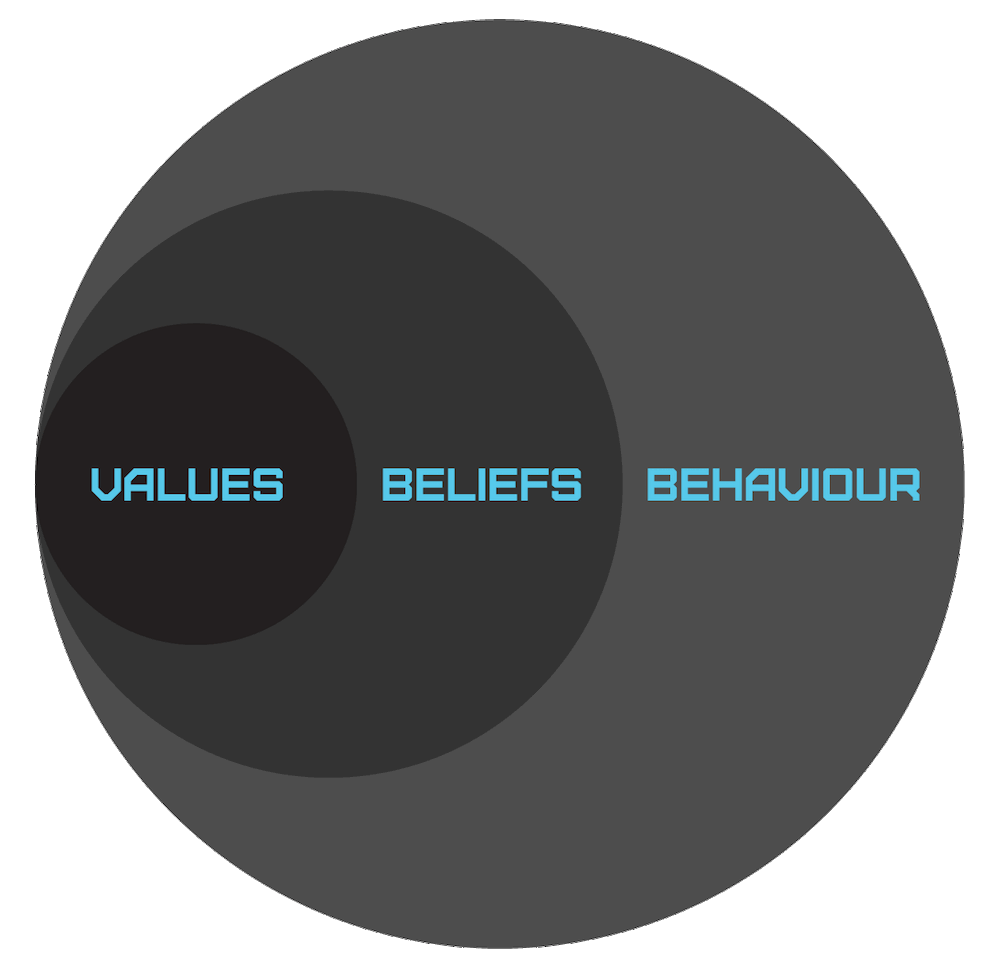What to do when your team have negative beliefs?
As a leader, do you get statements like these often?
“Boss, I can’t do this because it’s impossible!”
“Boss, we cannot do it that way. It’s wrong.”
“Boss, I think I’m not smart enough for the job. Can ask someone else to do it?”
Ok, the last one could be due of laziness, which we will address later towards the end of the post.
You can say it’s negative, disempowering, or even refusing to take responsibility to some extent. The truth is, it has something to do with their beliefs, which is what we will work on today.
THE ORIGIN OF BELIEFS
If the brain is a computer, the beliefs are the software that run it. Beliefs are deep-rooted in everything we see, hear, feel and think.
A few examples of beliefs are:
- When I jump from the stairs, I will fall.
- You need money to travel.
- I am grateful for the support I get all the time!
- Today is gonna be a great day! You'll see!
- I am too old to take a MBA.
- I only exercise when I'm free. Look at my schedule! How do you even squeeze gym into it?
- Exercise only at the gym. Walking to work is not considered exercise.
- I can find happiness in what I do.
- I will never be good at anything, because I'm stupid!
- Only the <Insert race here> can make it in this country. The whole game is about racism!
Recognise some of them? Do you say, or even think, some of them?
Beliefs can come from everywhere - our experiences, our environment, our family members etc. The movies we watch will determine how our outlook to life. The books we read will define our reality of things. The friends we hang out with all the time will decide what kind of future you have. Heck, even things we see on social media will affect our beliefs.
The question now is:
Are those beliefs benefiting, or limiting you?
WHAT POWERS THE BELIEFS?
If you dig deeper, you'll find that beliefs are actually powered by out values. Let's take a few from the list above and try to match them to some potential values.
- When I jump from the stairs, I will fall.
Potential values: security, fear, lack of bravery, logic - I can find happiness in what I do.
Potential values: gratefulness, contentment, sense of achievement - I am too old to take a MBA.
Potential values: contentment, money, work-life balance, family - Exercise only at the gym. Walking to work is not considered exercise.
Potential values: systems/routines, health, fitness
So as you can see, even if the values may be negative, like James saying "I am too old to take a MBA", truth is, the values that powers hime, say, "work-life balance" could be a positive thing. James appreciate the time outs from his hectic work schedule, and any free time he can afford is spent with his family.
The way to uncover a person's values can sometimes be as simple as asking "Why?"
You: "So James, why do you think you're too old to take a MBA?"
James: "Come on, I'm already 48, and I'm neck up with work. I want to spend more time with Grace and the kids."
That's James' answer, and you may not be satisfied with it. But can you do anything about it?
WHAT IF YOU ARE NOT HAPPY WITH THE "WHY"
Now, can you change a person's value?
The short answer is yes, but beware, changing a person's value will have drastic outcomes. In this case, James may not even be James anymore! Not to mention if you do it without proper permission, it's just plain manipulative.
But what if Grace (James' wife) really want James to take the MBA, to fulfil his potential, so he can be promoted and maybe work lesser? Side note: this is already mildly manipulative, because just because Grace thinks it's good, doesn't mean it's really good. You don't like people forcing/manipulating you into doing something you don't like, right?
Push come to shove, if you really want James to adopt the mindset of possibility, one that he is sure he can take on the challenge of pursuing an MBA. And using "work-life balance" as his value, this is what you can do,
You: "James, let me invite you to look at it this way. If you look at those successful executives, all of them seem to have a proper grip of their life priorities. I mean, they get to golf in another city every weekend!"
James: "Yeah, I was wondering how they manage to do all that. I mean while I won't be golfing around, but Grace and the kids sure would love a picnic in the country side or the beach every weekend!"
You: "I just find it odd that while all those execs are doing different things, but two things they all have in common is their work-life balance, and their MBAs. Perhaps it's something they pick up during their MBA that enabled them to become more effective?"
James: "Hmph, but I'm 48. Would it be too late?"
You: "Heck, most of those execs only started after 50. I think you still have a huge advantage! That's 2 years faster for you to achieve the life that you want!"
See how instead of changing someone's value, say in James case from work-life balance to ambition, you can get the person to look at their values from a different perspective? Ok, like I said, it sure looks mildly manipulative, but hey, at least you are not forcing James into doing something he didn't want; you're only getting him to see from a different perspective.
ANY QUICK-FIRE TRICKS?
Ok, maybe you may need some practice before getting your team members to see things from another perspective. Asking the right questions, discovering their values and painting the right metaphors are crucial.
In the mean time, because I'm a nice guy, here are a few questions to get you started. And this does not require you to uncover their values, which is a separate process on it's own.
So the next time you got your staffs coming to you with those negative statements (the ones we started this post off with), ask them these:
Have there been times when that is not true?
Is there really a rule to this, or it's just something someone made up?
Have anyone done it before? Yes? How was it executed?
Is age/race/gender really an issue here, or maybe you just don’t know how to do it?
Is there someone you can talk to, whom can help you with this?
Have you tried Googling for an answer?
If you were to know, what do you think your mentors will do?
Coaching question are great to get your staff to see things in a different light, in this case, from limiting to empowering perspectives. Sometimes they just resort to their negative or limiting beliefs because they can see the way forward. And as a leader, it’s your job to help them do that.
Hi there! Thanks for stopping by. I mostly blog about Steemit Success Strategies, business, marketing, entrepreneurship, psychology, community and random thoughts.
Talking about Steemit Success Strategies, if you want to 10x your results on this platform, perhaps some of these guides will be able to help you.
- How to generate at least 365 post ideas for your Steemit Life (and possibly never run out of ideas again!)
- 29 Steemit Post Types to Attract More Followers & Boost Your Popularity (Part 1)
- 29 Steemit Post Types to Attract More Followers & Boost Your Popularity (Part 2)
- Copywriting Magic for Steemit: "How To" Post Titles
- Copywriting Magic for Steemit: "List Type" Post Titles
- Steemit Success Strategies #1 - The Law of Requisite Variety
- Steemit Success Strategies #2 - Batching + Parkinson's Law
- How to apply the 80/20 rule to your Steemit Life
- Steemit Experiment Report: 21 days, 21 minutes, 21 posts later, PLUS an 8-Step Guide on How to Write a Steemit Post every day under 30 minutes
- Case Study on Bid Botting - A Steemit Bootcamp follow-up module, a cheatsheet and why I probably won't use it
At least once a month, I run Steemit community events and training workshops with my buddies at #teammalaysia too. Some examples are:
- Steemit Bootcamp March 2018 - KICKSTART Your Steemit Success
- BoilerRoom 03.03.2018 | Let's Huddle, Hustle & Hack Out Awesome Steemit Contents!
I'm also grateful to be part of #steemitbloggers , SmartSteem and the sndbox.


Animated Banner Created By @zord189

Wait, why's Mav posting on Steemit nowadays?
Well, unlike other blogging and social media platform, Steemit is the only platform that allows me to earn cryptocurrency when I engage with it. Yup, one Steem is about USD5, and you, too, can earn Steem Dollars every time you:
- Create content (articles, blog posts, podcasts, videos, photos)
- Upvote (like) other people contents
- Comment on other people's posts
- Have discussions, share opinions etc!
Yup, basically it's the very same thing you're doing on Facebook, Twitter, Instagram etc all along!
The only difference? For once you can earn a nice income on the side!
Sign up for a free Steemit account, and you can thank me by coming back and upvoting this article. And guess what, you will earn Steem too for doing that! #awesome







What's the most effective way to develop common values within the team? (Because sharing common, right values is an essential foundation in cultivating teamwork)
Since it's not "ethical" to develop values in someone (unless it's already there), it's better for each individual team member to identify their values, and align them to the common values of the team or the company. That way, it's like changing the way they interpret their values, rather than changing the values itself.
Values, Beliefs, Behaviours... the neurological path towards performance. Not forgetting the Drivers (Attitudes and Motivations) and Competencies in between as well. Great article as always @maverickfoo
Got a great coach, so gotta live up to the name.
Good post man. I used to do this all the time with my staff. Gave them and me a good sense of commitment :)
Awesome! Any tips you can share that I've missed out?
I enjoyed the post a lot - I think it's awesome as is :)
I really liked this, I think we often limit ourselves through the different beliefs we have instilled within ourselves. It takes time and practice to change these limiting beliefs but know they can be changed over time.
As they say, A-B-C!
Awareness Before Change!
I like to think that continuous improvement should happen on a daily basis, even at 1% improvement. That's 365% in a year, you know?
I like this. So very very true! Baby steps through change.
great post! true enough, our actions really boil down from our beliefs, and while those can be hard to change, it is not impossible as long as you know which angle to take. well, you say that it is manipulative, but most people do it unconsciously. they can chalk it up as influence or just a way with words. :3
Haha, manipulation, motivation, influence, charisma. It comes in many representations, but end of the day, it's the intentions that count
Some great insight there. I've unwittingly adopted some of these approaches with my more 'pessimistic' team members. Others I've missed out on, but will certainly try.
Nice post, some team members might think a task is impossible, so to make them belief its possible, you just have to live by example. Do it yourself while they learn from you.
WOW! That's one solid post right there. Thank you for your insight. Will try to attend one of your sessions.
Limiting beliefs are one of the biggest problems we face when we want to change something in our lives and of course that is even a bigger issue when you want to change something in your team. The change comes from inception, an idea you plant into the team member's mind once you figure out his reasons for the behaviour you want to change. That is some powerful stuff. Thank you for sharing that
Many of the beliefs come from the social experiences one has to carry out.